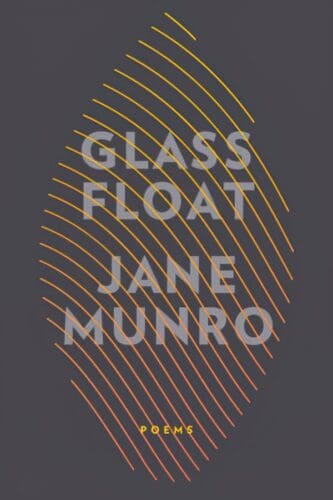Book Review: Glass Float by Jane Munro
 Reviewed by Marguerite Pigeon.
Reviewed by Marguerite Pigeon.
In her last collection, Blue Sonoma (Brick Books, 2014), Jane Munro used dreamscapes and reportage as paper and pen to trace jagged contours of meaning during her husband’s dementia and death. Those poems were sober, plainspoken—and won Munro a Griffin Poetry Prize.
Six years later, Munro is back with Glass Float (Brick Books, 2020). Her tools are new: narrative and diaristic series interspersed with flashes from the biographical past. But Munro has the same ambition to summon meaning from the jumble of experience.
Many of the poems in Glass Float assemble moments from the narrator’s recent life, especially her yoga practice, which has seen her travel from Vancouver island to multi-day workshops in India and Italy. Like the titular glass floats—hand-blown globes once used to keep fishermen’s nets afloat—she bobs intercontinentally, her poems floating with her in the observational mode, hemming close to the surface of images: the long snout of a bear on a coastal mountain; rice-water meals during a demanding Ayurvedic purge.
Yet early on, Munro warns us away from surface reading:
My grandfather also said, Art is suggestion; art is not repre-
sentation.
This grandfather, an artist, taught Munro the tricks of illusion, revealing how concave surfaces are simultaneously convex. Munro holds to this idea of the gestalt switch throughout Glass Float. In one three-poem sequence, for example, the narrator tours diverse settings—a termite mound in South Africa, an ancient tomb in Turkey, and a cave in India—studying each from the outside, then exploring within. The exterior always belies hidden stores of beauty, poignancy, and energy. From ‘Termite Mounds: India’:
Shortly after dawn we sat on the stone floor of the Visvakarma
Cave — the Carpenter’s Cave. Its domed ceiling is carved from
the living rock with beams that look like wooden barrel ribs or
the long timbers of an upturned hull. We were within the dim
reaches of an ancient body.
Munro honours this ancient body and, the reader senses, hidden layers within herself—those murky strata of subjectivity. In ‘Geeta’s Clues Against Depression #1,’ a yoga instructor named Geeta, daughter to the great yogi B. K. S. Iyengar, describes self-discovery within yoga practice as “donkey work.” She is referring to the surrender required for self-knowledge in yoga. But Munro hints at more, that being oneself through life is our truest labour; we carry the past, struggling under the burden of chance, loss, and previous iterations of the self.
In yoga, there are tangible rewards for the effort, as Munro reports in a poem about breath work called ‘If it were a vitamin pill, you’d take it’:
… you can see the difference in people with a reliable daily prana-
Yama practice. Their grace, ready energy, discernment. Humour. Wit.
Naming the rewards for holding oneself together through time (or writing poems about such) is less obvious, as we learn in the enigmatic ‘Receive your face,’ in which a yoga instructor asks her students to inwardly contemplate their face:
My face floats back to me.
Tears spring into my eyes. Is my face lonely for such a welcome?
To receive this flawed one carried by many waves—this face that
Somehow landed here safely.
Reflecting on waves of the time, on bodily practice, and on life experience allows Munro a fuller hold of the present. There is grief for a lost partner here, but also joy and spaciousness, as in the poem, ‘Keep the Oil’:
You hide your greasy hair with a turban. It’s more than a year
since your husband died. You have a lot to relinquish – why you’re
here. For the first time in your life you’re only responsible for and
to yourself. Directly responsible, that is. It’s a galaxy full of dark
energy, dark matter: within you, what’s never been lit?
in Glass Float, Munro has set out to renew her perspective on herself. As readers, we follow her lead, welcome what emerges into the light.
Glass Float by Jane Munro (Brick Books, 2020) ISBN-13: 9781771315241
Jane Munro’s sixth poetry collection Blue Sonoma (Brick Books) won the 2015 Griffin Poetry Prize. A member of the collaborative poetry group Yoko’s Dogs, she’s been a professor of Creative Writing at several universities in British Columbia, taught many informal writing workshops, and read her poetry to audiences across Canada. For more than 20 years, she has studied (in Canada and India) and practiced Iyengar Yoga. In 2012, she moved back to Vancouver—where she grew up and raised her children—after spending 20 years living rurally on the coast of Vancouver Island.
Marguerite Pigeon writes poetry and fiction. Her first collection of poems, Inventory (Anvil 2009) was a finalist for the Gerald Lampert Award. She has also published two books of fiction. Her next publication, a book-length poem called The Endless Garment, about fashion and dress, will appear in 2021 with Wolsak & Wynn. Originally from Blind River, Northern Ontario, she lives and works in Vancouver.
